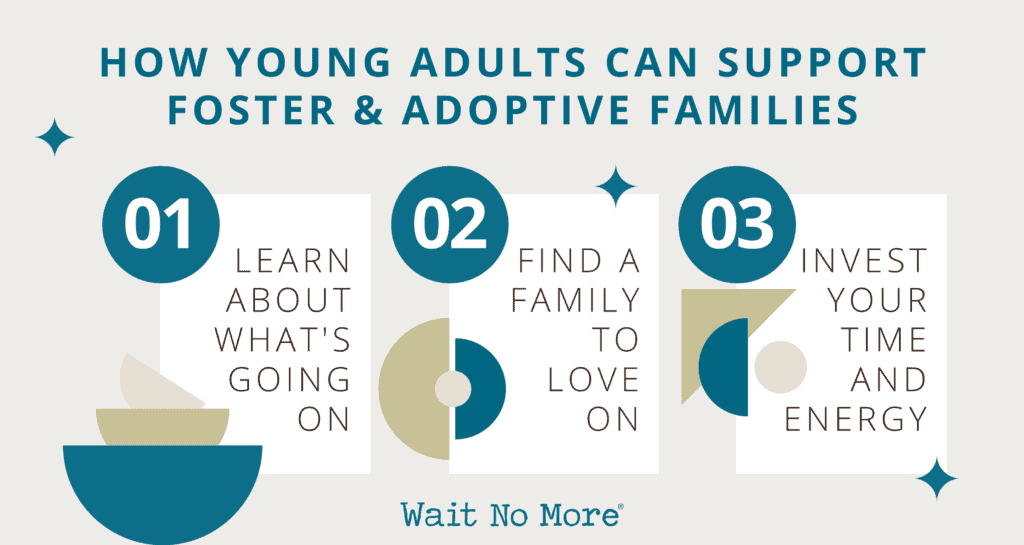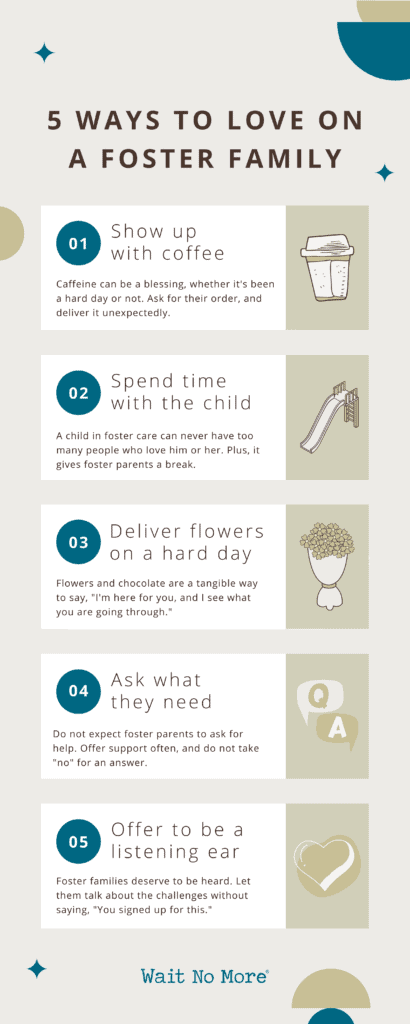Young adults are uniquely positioned to make a difference for foster and adoptive families. Perhaps in this phase of life, you cannot foster or adopt. That is more than okay. There is a huge need for support in the foster and adoption community.
As you consider your future, you may wonder what family life will look like for you. Why not experience family life firsthand by supporting a foster or adoptive family? As you engage with foster care and adoption, you will see a unique side of parenting. And what you learn while supporting foster and adoptive families may be the most helpful preparation you receive.
But aside from the personal benefits of supporting foster and adoptive families, this is a command from God. As Christians, we are called to care for the vulnerable (James 1:27). Children in foster care are perhaps one of the most vulnerable demographics. And our age is not an excuse to sit on the sidelines (1 Timothy 4:12).
There are foster and adoptive families in your community, and they need your help. As a young adult, you can maximize your time and energy to make a lasting difference. Here are three ways to support foster and adoptive families as a young adult.

1. Learn About What’s Going On
It may be easy and comfortable to remain ignorant of the situation, but that’s not how we make a difference. Foster care in the United States is at a crisis level.
Foster Care By the Numbers
Currently, there are over 400,000 children in U.S. foster care. Depending on where you live, there may be anywhere from 500 to 50,000 children in foster care in your state. Nearly 30% of those children are legally available for adoption.
These are children in your community. They attend the schools in your town and play at parks in your neighborhood. They may be in the nursery or Sunday school class at your church. One of the first ways you can help foster families is by understanding the reality of the situation. Understand why they are compelled to foster or adopt. Then, be willing to support them as they live out their calling.
Become Trauma Informed
Beyond the numbers, there is trauma. Every child in foster care has experienced trauma, often due to abuse or neglect. Being removed from your home (even if it is unsafe) also causes trauma.
When interacting with foster and adoptive families, it is important to know that children with trauma may exhibit behaviors such as lying, stealing, and tantrums. You can support foster and adoptive families by learning about trauma-informed care. Or suppose you are babysitting or providing respite support. In that case, it is crucial to listen to the strategies that a foster or adoptive parent shares with you to best address a child’s behavior.
2. Find a Family to Love On
Foster and adoptive families live throughout the country. It may not always be easy to identify them, but it is important to try. They may live in your neighborhood, attend your church, or work beside you. Ask around! Your pastor, neighbors, professors, and coworkers might know of a foster/adoptive family that needs your support.

From the practical to the creative, there are so many ways you can support a foster or adoptive family.
When one of my friends started fostering a ten-year-old child, here were five ways I supported them:
Show Up with Coffee or Tea
Sometimes I can sense when it has been a hard day for my friend who is a foster mom. On those days, I want to bless her with caffeine—especially if the challenge comes from a lack of sleep. But there are other days where she just tries to power through. On those days, too, I try to bring a small bit of joy into her life.
Spend Time with the Child
It was honestly daunting for me to offer babysitting and respite support. While I enjoy being with kids, I was worried my “babysitting skills” would not measure up with a child who had experienced trauma. But thankfully, my fears were incorrect.
One day, I spent nearly three hours at the park with the child. We played basketball, soccer, and football. And we talked. I asked questions, and I got to show the child that they were loved—while also giving the foster parents a much-needed break.
Another time, I helped with school drop-off while the foster parents attended an appointment out of town. I sacrificed sleep to show up at their home before sunrise. When the child woke up, I helped them get ready for school. And as we waited in the car for the school drop-off line to start, we sang along to music together.
Each time, I got to show love to the child. And I also directly supported the foster parents who needed help or time to themselves.
Deliver Flowers on a Hard Day

In reality, you never need a reason to drop off flowers and chocolate at a foster or adoptive parent’s house. But on the day I did deliver flowers and chocolate, there was a very good reason.
Termination of parental rights (TPR) was taking place. My friend was caring for a child whose biological parents’ rights were being terminated. TPR comes with immense loss, grief, and brokenness—for the child, their biological family, and so many others. On a day when I could not do much to support the foster family, I delivered flowers and chocolate. It was a tangible way to say, “I’m praying for you, and I’m here for you.”
Ask What They Need
Not long after my friend received her first foster placement, I gave her four options of ways I could support her during an upcoming weekend. I also told her I would not take “no” for an answer. She could choose from meal delivery, running errands, a gift card, or babysitting. (Or if there was something more pressing, I was open to helping with anything.)
Directly asking what a foster or adoptive family needs can be a relief for them. Often, they do not want to be an inconvenience or ask too much of their support system. But this can leave them without any support at all. Do not expect a foster or adoptive family to ask for support. Rather, offer it often and without strings attached.
Be a Listening Ear
If you are close with a foster or adoptive parent, one of your greatest gifts to them is your compassion and understanding. Whether or not things are going well, be open to hearing their stories.
For one, hearing about the realities of foster care broadens your perspective of what unfortunately takes place every day: child abuse, neglect, and abandonment. It opens our eyes to things that happen within our own communities.
Secondly, foster families deserve to be heard. Foster care is so often silenced. The challenges of foster families are regularly dismissed with an unhelpful “you-signed-up-for-this.” Go against the trend of leaving foster families to fend for themselves. Instead, offer a listening ear. Be an encouraging friend.
3. Invest Your Time and Energy
Service is a valuable investment. Whether you are serving a foster/adoptive family directly or indirectly, you can make an immense difference.
Connect with a Bridge Organization
Bridge organizations collaborate with foster/adoptive families, state government, and community volunteers. Bridge organizations often have several ways you can serve. Some volunteers serve as church advocates, trainers, and support group leaders. Other volunteers serve as “hosts” for visits between biological parents and their children. Some bridge organizations have clothing closets for biological and foster families, and volunteers help keep the store stocked and organized. Research a bridge organization close to you, and ask how you can serve.
Become a Court-Appointed Special Advocate
One of the most consistent people in the life of a child or youth in foster care is a Court Appointed Special Advocate (CASA). CASAs are volunteers appointed to be a voice in court for a child, teen, or sibling group. If you can be a friend to a child, then you can be a CASA. The minimum age to be a CASA is typically 21 years old. Research whether your state has a CASA program, and start making a difference in a child’s story.
My Message to Young Adults
The young adult years shape so much of our life to come. I want these years to be worthwhile, not wasted. For me, supporting a foster family has been such a blessing.
I have seen firsthand the brokenness of foster care and adoption. But I have also seen the beauty. I’ve learned about trauma-informed care and how to identify signs of trauma. As I have spent time with children in foster care, I’ve gained a greater sense of compassion for biological parents and foster/adoptive parents.
As a young adult, I am in an incredible position to support foster and adoptive families. And in my experience, I can confidently say that it is worth it.
If you need more suggestions or ideas of where to start, visit WaitNoMore.org or follow us on Instagram at @WaitNoMoreOfficial. You can also reach out to local foster care agencies or bridge organizations to see how you can serve families in your community.















